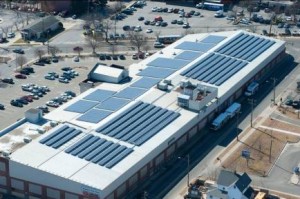Public-private solar leasing program expands
Connecticut, in partnership with U.S. Bancorp and a consortium of lenders, has amassed nearly $60 million in financing to help expand a 2008 solar leasing program that has already facilitated more than 850 home solar system leases.
The second rollout of the CT Solar Lease program will provide for the installation of about 1,500 solar photovoltaic systems and about 400 solar thermal systems, which were not covered under the initial program. Additionally, businesses and larger organizations will be eligible to participate, with about $12 million reserved for leases of commercial-scale systems.
Under the program, which was launched in August 2008 by the Clean Energy Finance and Investment Authority (then the Connecticut Clean Energy Fund) and U.S. Bancorp, homeowners could apply to lease solar systems under 15-year contracts from the public-private organization CT Solar Leasing L.L.C.
Since its inception, the program has been managed by AFC First Financial Corp., which in turn contracts with local solar firms for the design, installation and maintenance of the solar systems.
The Connecticut program was modeled after leasing options offered by the likes of SolarCity and SunRun that allow homeowners to supplement electricity provided by their utility with solar-generated power, without them having to buy or pay to maintain the systems themselves. Instead, homeowners pay a monthly fee, either at a fixed or escalating rate, and in exchange are able to save money on their monthly electric use.
For the expanded leasing program, the state is kicking in $9.5 million in taxpayer funds and the remaining $50 million will be provided by U.S. Bancorp and a consortium comprising First Niagara Bank, Liberty Bank, People”™s United Bank and Webster Bank.
The goal of the program is twofold: first, to give homeowners and businesses that are unable to purchase solar systems outright access to cheap, clean power; and second, to level the playing field between national and local solar installation companies, said Bert Hunter, chief investment officer of CEFIA.
“The whole idea here is to open access to capital for independent installers,” Hunter said. “It means that more installers will be able to offer no-money-down lease financing for solar PV as well as solar thermal, which is solar hot water. It means that more installers will be able to do that, not just a few national firms.”

What that translates to, Hunter said, is more choices for homeowners and more competition among installation firms. Hunter said there are 40 solar installers that are active in Connecticut, estimating that most are located in the state with some based in Massachusetts, New York and New Jersey.
The entity CT Solar Leasing has also partnered with the solar unit of Assurant Inc., which will provide bundled property, casualty and liability insurance for the leased systems.
Leases for participants in the second rollout of the program will total 20 years, with participants having the option of buying the system outright from CT Solar Leasing anytime between the five-year mark and the end of the contract. Leases can either be on a fixed or escalating rate, with the latter beginning at a lower level and increasing incrementally each year.
Hunter estimated the $60 million fund would last about two years. He said the state would fully recover its investment, with any returns going back to Connecticut ratepayers.
“When we give incentives to a SolarCity or a SunRun, that money is gone ”” it”™s gone to their investors,” Hunter said. “But because the citizens of Connecticut are essentially investing in their solar future … the financial returns come back to the state of Connecticut.”
Nationally, reports have suggested that solar leasing is growing at a much faster rate than solar system purchases. Hunter estimated that about one-third of the solar systems installed in Connecticut at present have been leased, with the remainder financed by the property owners.
“Connecticut is just about the inverse of a market like California, which is two-thirds or more lease-financed,” Hunter said. “I think that with more of a lease model available in Connecticut, we”™ll probably see the numbers shift more toward what you have in California.”
Editor”™s note: This article is part of a two-part series on the growth of solar adoption in Connecticut. The second part will be published in the July 22 edition of the Business Journal.